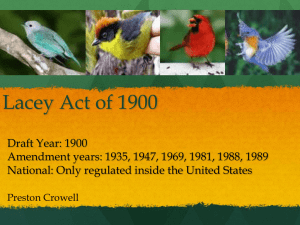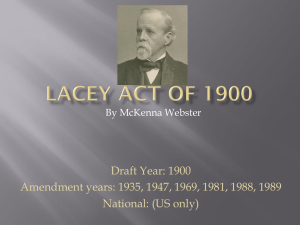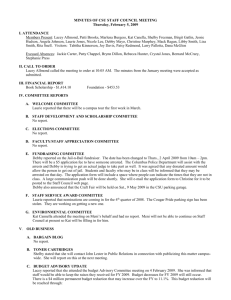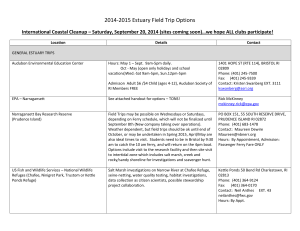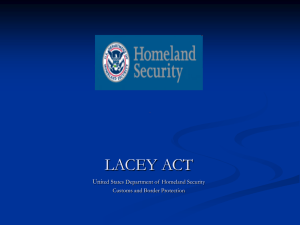Lacey Act Compliance Webinar
advertisement
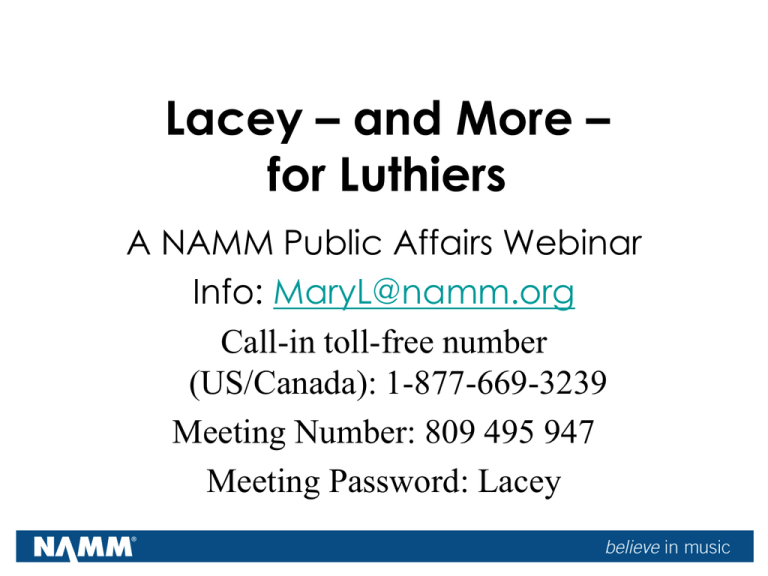
Lacey – and More – for Luthiers A NAMM Public Affairs Webinar Info: MaryL@namm.org Call-in toll-free number (US/Canada): 1-877-669-3239 Meeting Number: 809 495 947 Meeting Password: Lacey Participants • James M. Goldberg, NAMM Government Affairs • Mary Luehrsen, NAMM Public Affairs What is the Lacey Act? • 100-year-old law originally designed to protect against illegal taking of wildlife • Amended in 2008 (as part of the omnibus farm bill) to cover plant material, including wood The 2008 Amendments • Unlawful to import, export, transport, sell, receive, acquire or purchase any plant (including wood) that was taken in violation of law • Must file declaration (document) for imports containing scientific name of plant material, country of origin, value of the product and quantity of the plant Who Enforces Lacey? • Many government agencies involved, including CBP, FWS, DoJ and USDA’s APHIS (the lead agency) • Good source for all things Lacey: – www.aphis.usda.gov/plant_health/lacey_ act/index.shtml Tell Me in Plain English • Make sure imports were obtained legally • Make sure import documentation and records are true and accurate • Make sure an import is properly declared What About the Import Declaration? • Effective April 1, 2010, applicable to HTS categories 9201 and 9202 (pianos and other string instruments) • Other instrument categories may come later Plant and Plant Product Declaration Form (PPQ Form 505) • Estimated date of arrival • Entry number, container number, bill of lading • Importer name/address/ • Consignee name/address • Description of Merchandise (w/HTS number) More PPQ Form 505 • Article or component • Plant scientific name (genus and species) • Country of harvest • Quantity of plant material • Unit of measure • % recycled material • Signature under penalty of perjury The Lacey Act “Adopts” Foreign Laws For Products in Trade in the U.S. • • Foreign laws that act as “underlying” violations – Laws that generally “protects plants,” – Laws that regulate: • (I) the theft of plants; • (II) the taking of plants from a park, forest reserve, or other officially protected area; • (III) the taking of plants from an officially designated area; or • (IV) the taking of plants without, or contrary to, required authorization – Failure to pay appropriate royalties, taxes, or stumpage fees – Laws governing the export or transshipment of plants. Covers many of types of laws – Illegal harvesting of timber in national parks – Forgery of shipping documents – Failure to pay taxes – Transporting of timber at night in violation of a curfew designed to combat illegal timber trafficking Penalties Under Lacey Act • Forfeiture – Strict liability – Forfeiture possible even if no knowledge of underlying violation (e.g., that the timber was harvested illegally). – Likely no “innocent owner defense” for goods whose possession is illegal under the Lacey Act – Vessels, vehicles, aircraft or other equipment used in the commission of a Lacey Act felony are also subject to forfeiture after a felony conviction • Civil administrative penalties – If defendant actually knew, or in exercise of due care should have known, of violation of an underlying law, potential civil penalty up to $10,000 per violation – Government can argue lack of “due care” by showing that the respondent is in the business Penalties Under Lacey Act • Fines and imprisonment – If, in exercise of due care, should have known of the underlying violation – misdemeanor prosecution • Penalties of up to $100,000 fine ($200,000 for organizations) and/or • Up to one year imprisonment – Knowingly engages in illegal trafficking, while knowing of violation of underlying law – felony prosecution • Penalties of up to $250,000 fine ($500,000 for organizations) and/or • Up to 5 years imprisonment Practical Advice • Do not confuse declaration requirements with legality issues – Legality requirements applies and enforcement is possible regardless of whether declaration is applicable • Understand your sourcing – Beware of deals that are “too good to be true” Lacey Does Not • Does not apply to personal imports • Does not apply to exports • Does not require permits for intrastate (within U.S.) shipments • Does not apply to specific woods Lacey Act Problem Areas • Difficulty in identifying a single species for many products • Inability to identify any species for some products (e.g., composites, paper) • Need for de minimis provision • Applicability to all products, regardless of age (e.g., vintage guitars, antique instruments) What is NAMM Doing? • Working with industry coalition to identify problem areas and suggest “fixes” • Working with governmental interagency task force • Upcoming report to public and Congress presents opportunity to advocate legislative fixes What Other Laws Apply? • CITES (Convention on International Trade in Endangered Species) • Bans trade in certain listed species, e.g., Brazilian Rosewood • Can still export pre-1992 rosewood products with permit from FWS What Other Laws Apply? • Endangered Species Act • More stringent than CITES • If species is listed (e.g., ivory, certain abalone) a permit is required but unlikely to be issued unless product is more than 100 years old • Applies to trade within U.S. What Other Laws Apply? • To import/export any product containing fish or wildlife product (e.g., shell), must file Declaration – FWS Form 30177 – Found at FWS law enforcement web Questions? • For further information contact MaryL@namm.org
